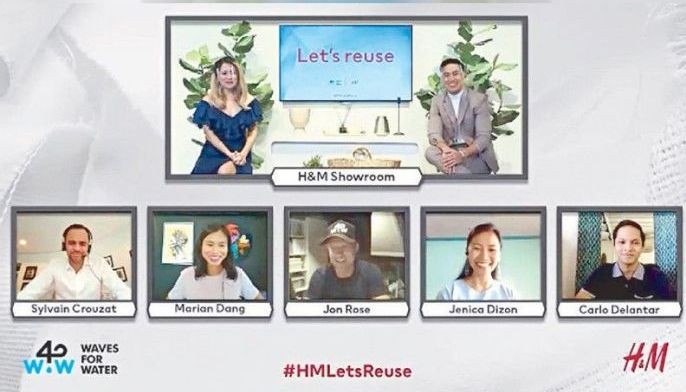MANILA, Philippines — When we compare it to plastic, making a paper bag emits 51 percent more global warming gasses,” notes UN Environment Program Goodwill Ambassador and founder of eco-conscious non-profit organization CORA Antoinette Taus, while hosting H&M’s Let’s Reuse launch. “It creates 50 times more water pollution, uses four times more raw materials, and consumes two times more energy.”
H&M Philippines head of communications and co-host Dan Meija added that “about 80 percent of all paper bags end up in landfills — where they often won’t biodegrade for decades because of a lack of oxygen. And compared to plastic bags, paper bags costs more to landfills because they take up more space by weight and volume.”
The Let’s Reuse initiative was thus born with the simplest premise: to encourage more people to shop using reusable bags, not only at H&M stores, but everywhere. Their method in encouraging shoppers to do so is also deceptively simple: asking that you either bring your own reusable shopping bag or pay P2 per paper bag requested. Making the effort more meaningful is the fact that 100 percent of the bag charge proceeds will be donated towards Waves For Water.
Waves for Water (W4W), for those who have yet to hear about it, is a non-profit organization started in 2009 by professional surfer Jon Rose. Its main goal is to address water scarcity in developing communities all over the globe, in a way that involves and empowers those most affected both by the lack of access to clean water, and the issues that inevitably arise from this lack. W4W country director Jenica Dizon explains that the lack disproportionately affects women and children. “They are often tasked with fetching water for their households — unpaid work, in effect causing a loss of productive hours in education, menstrual health management, and other opportunities.”
Globally, W4W has successfully implemented 155 various clean water programs in 48 countries, which has had a direct impact on an estimated 3.7 million individuals. They’ve also actively responded to 33 natural disasters in locations around the world, including the Philippines. Locally, their work has allowed them to reach 56 out of 82 provinces in the country, directly helping one million Filipinos. Dizon credits their partners and those she calls community champions, saying, “With H&M’s Let’s Reuse project, we’ll be able to reach more.”
The beauty of this project is that there’s no real way to lose. Bring your own reusable bag and take a small, very doable, very easy, and quite practical step towards sustainability. Forget your bag a couple of times, and find that a would-be penalty is instead a donation. H&M Southeast Asia sustainability manager Marian Dang says, “We want to educate and make it easy to understand that by not taking single-use bags at the cash point, you are doing something good for the planet. But if you have to buy a bag because you are not prepared yet, you are still contributing to provide clean water to local communities through Waves for Water Philippines.”
The project is expected to roll out on Sept. 1 at all Philippine H&M stores, and the bag charge will apply to every paper bag of every size. Dang concludes, “We see the potential to create awareness of what sustainable fashion is about, and what small actions everyone can contribute while being locally relevant. Based on our experience from other markets, that bag charge has led to a significant decrease in actual paper bag usage, where millions of paper bags have been saved.”
* * *
To learn more about Waves for Water, click on over to wavesforwater.org or their Instagram at @wavesforwaterphilippines.
For more information and updates on H&M’s further sustainability efforts, stay tuned through H&M on Facebook and @hmphilippines on Twitter.


